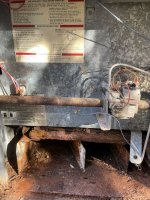Just wanted to say Hi!
We bought our house a couple months ago and it came with a salt water pool! The previous owner had a cover on it to keep the leaves out and I haven't yet opened it up to take a look. I did buy the Taylor K-2006 for once it warms up a little and I can take off the cover.
Only question I have is, I had the pool inspected and the pool heater is just a big pile of rust. The inspector freaked a little when he saw the condition it was in. He recommended the Jandy jxi400 and said they have a few in stock and can get it installed ASAP but I see on here everyone recommends Raypak. I tried looking at Raypak's site and couldn't find any AD's near me. Should I keep looking or is the Jandy ok? I live just north of Atlanta.
We bought our house a couple months ago and it came with a salt water pool! The previous owner had a cover on it to keep the leaves out and I haven't yet opened it up to take a look. I did buy the Taylor K-2006 for once it warms up a little and I can take off the cover.
Only question I have is, I had the pool inspected and the pool heater is just a big pile of rust. The inspector freaked a little when he saw the condition it was in. He recommended the Jandy jxi400 and said they have a few in stock and can get it installed ASAP but I see on here everyone recommends Raypak. I tried looking at Raypak's site and couldn't find any AD's near me. Should I keep looking or is the Jandy ok? I live just north of Atlanta.




